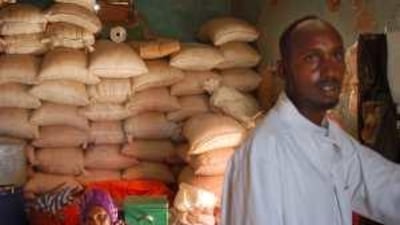BURAO, SOMALIA // In a dimly lit warehouse behind the bustling market in this northern Somali town, white plastic sacks full of sorghum are stacked nearly to the ceiling. Most of the 200 or so bags of grain have the United Nations World Food Programme (WFP) logo on them. Some are from the United States Agency for International Development and have the words, "Not for sale or exchange" written on them.
However, all of this food, intended as handouts to some of the world's neediest people, is for sale. Corruption is adding to the already catastrophic food crisis here in Somalia, where three million people, or one-third of the population, are dependent on food aid. In south and central Somalia, where nearly 20 years of war has ravaged the country, warlords commonly steal food aid and use it to control the population. Here in the more stable northern region, where many have sought shelter from the fighting, some of the food is stolen by corrupt officials looking to make a profit.
"There is corruption," said Asha Essa, who lives in a camp for displaced people on the outskirts of the town. "I have seen the officials selling our food aid in town." The displaced people who live in this dusty, sprawling camp of stick and plastic tents lament the fact that they have to buy the food that should be given to them. Many cannot afford to pay the US$7 (Dh25) for a 25kg bag of sorghum. Rising food prices and hyperinflation have put even basic food out of reach for the most vulnerable.
"There's no food," said Ali Gouled, a camp resident. "When they bring rice, people take it to town. It flies away from here like a bird." Hassan Bilaal, a programme assistant for the WFP, said 80 per cent of the grain sold in Somali markets had been intended as food aid. He said corruption is partly to blame, but much of it is sold by the aid recipients themselves so that they can earn money to buy sugar and tea and other basics.
"If a family gets two bags of sorghum, they will sell one," he said. Besides corruption, inflation, rising food prices and war, Somalia has been hit with one of its worst droughts in decades. This collection of calamities in the past year has caused what many consider to be the world's worst humanitarian crisis. Somalia is the WFP's second largest operation in the world, after Sudan. Malnutrition rates among children here are up to 20 per cent, the WFP says.
"Malnutrition is very common in Somalia," said Gerardo Romay, a programme officer with WFP. "It is very critical and it is everywhere." The people living in the camps are supposed to receive food donations at the beginning of each month consisting of rice, sorghum, maize, beans and vegetable oil. But the people living in this camp say they have not been fed for three months. "All of us, we are hungry," said Arfi Ainashe, who has watched four of her eight children die. "The food is not sufficient."
The war in southern Somalia is complicating relief efforts. Somalia has been embroiled in near constant fighting since 1991, when Siad Barre, the dictator, was overthrown by warlords. The warlords then turned against each other in a struggle for control of the country. In 2006, an Islamist movement briefly came to power, but was ousted by Ethiopian forces. The Islamists have waged a guerrilla war ever since.
The Ethiopians remained in Somalia until January. After their pullout, the Islamists have continued their war against African Union peacekeepers. At least 11 AU troops were killed in a battle last week. The refugees here in northern Somalia have lived through more than two decades of displacement. They fled to Ethiopia in the 1980s when the Barre regime launched a civil war against the northern Somaliland region. When Ethiopia faced its own war in the eastern Ogaden region, the Somalis went back home, where they have continued to live in squalid camps.
They hack out a meagre existence in the flat, dry scrub brush. Many raise livestock or work as labourers in town to earn extra money to buy back the food rations that are being sold in the market. The global food crisis last year made life particularly tough even for these resilient people that are used to hardship. "This year has been the hardest," Mrs Ainashe said. "We have had no water. The food prices have gone up. It is a harsh life."
mbrown@thenational.ae

